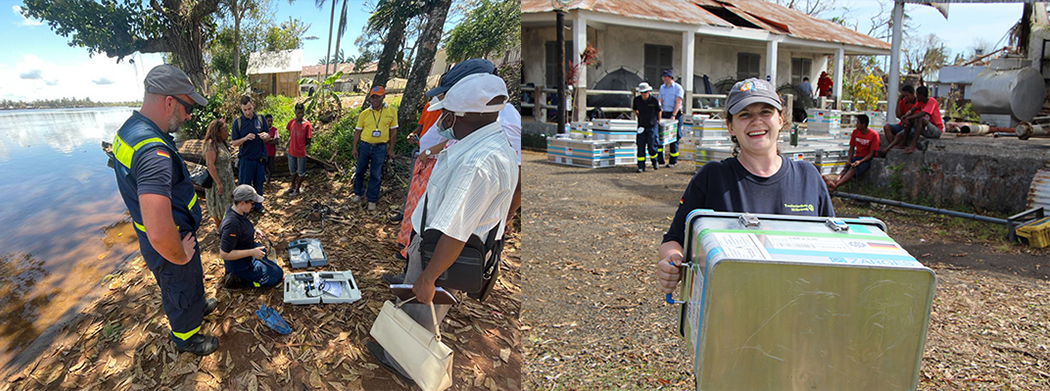
Miriam Grüneberg analyzes drinking water quality in Madagascar
Source: THW/Susanne Hörle
Miriam Grüneberg is a chemical-technical assistant (CTA) in the division Chemical and Optical Sensing at BAM. She has been volunteering with the Technische Hilfswerk (German Federal Agency for Technical Relief/ THW) for 20 years and contributes expertise she acquired at BAM to the Rapid Deployment Unit Water Supply Abroad (SEEWA). The SEEWA is a unit of the THW that repairs wells and water pipes after a disaster and restores the drinking water supply. She reports about her experiences in Madagascar.
What exactly is your job at SEEWA?
At SEEWA, I am responsible for testing the purified drinking water. The water that is treated by THW abroad must comply with the strict German Drinking Water Ordinance. I check it chemically, physically and biologically. I also check the raw water. I have to keep precise laboratory records of everything I do and provide information on water quality to the local water authority.
What did you do in Madagascar? What was your daily work routine?
Madagascar was hit hard by cyclone "Batsirai" in February and the islanders had no clean drinking water. Our team therefore first looked for a suitable source of drinking water. To do this, we drove to several villages that had been badly affected by the cyclones, checked the raw water there and looked for a suitable place for our mobile lab, which has nearly 16 tonnes of equipment.
After we found a source, we first had to set up the entire camp, including the laboratory. My working day looked like this: In the morning, I checked the chlorine content of the clean water bubbles and did a clean water analysis after the team's daily meeting. Throughout the day, I accompanied the drinking water production and checked the values. In the evenings I did microbiological analyses of the water by taking samples from the plant and the drinking water reservoir.

Set up of the mobile laboratory and cooperation with the local authorities
Source: THW/Susanne Hörle
How did your work at BAM prepare you for the assignment in Madagascar?
Since I am lucky to work in an international group at BAM and English is part of my workday, I had very good prerequisites for my assignment. In addition, due to my long experience in several laboratories at BAM, I had a good overview of the laboratory budget - when what was needed and when which measurements had to be conducted.
What tips do you have for BAM employees who want to volunteer?
Volunteering is a very broad field and a lot of information about it can be found online. There are also regular fairs where organisations and interested volunteers can meet. They provide a very good overview of all the possibilities.


